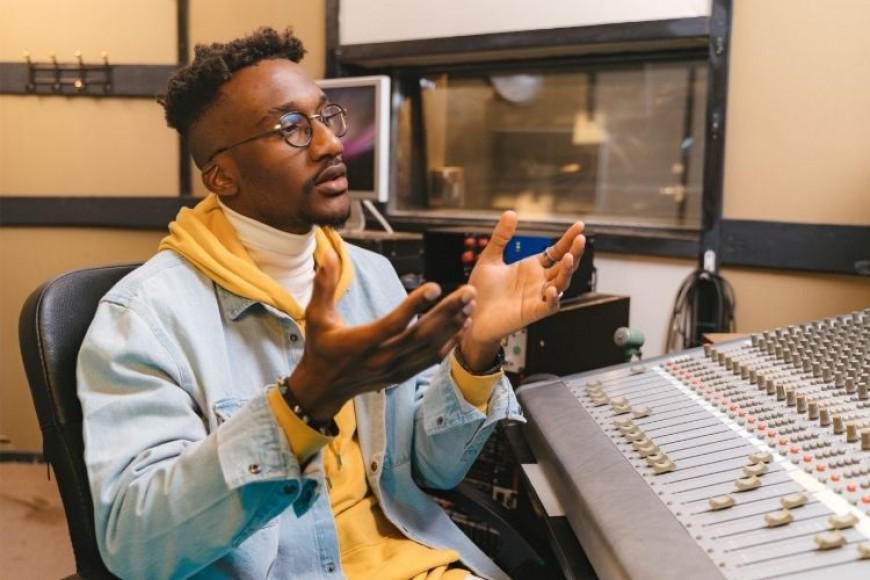Should I Study Music in College?

Studying music in college either as a major or minor can sound either fun or overwhelming to students. Deciding whether to pursue music after high school comes with commitments and rewards.
There are benefits to both majoring in music and obtaining a music degree or pursuing music on the side in addition to your major. Students should consider majoring in music in college only if they are passionate and dedicated to having a career in the arts. If you can see yourself performing, composing, conducting, or working in the music industry five, ten, or twenty years after college, then music is for you!
Students who want to grow their music vocabulary and theory, dive into music technology, or perfect their performance skills would benefit from majoring in music. As a music major or attending a music conservatory, you will be surrounded by music, repertoire, and musicians 24/7. You must be willing to dedicate study time to learning ear training, harmony, and music history while prepping recital pieces. Even if your major is in music business, composition, education, or music therapy, there is typically a significant portion dedicated to performance of your principal instrument.
Majoring in music provides a well-rounded music education for the eager musician. If you have your heart set on performing to sold-out audiences, teaching at a university, working for a record label, or working in a hospital as a music therapist, having a degree in music will help you realistically reach these goals. Majoring in music is an investment, and there is no guarantee of a job outcome afterward. However, a music degree is very much respected in the industry. It is also a wonderful place to network and collaborate with peers and professors who may help you along the way in your musical pursuits.
Not ready to take the plunge and major in music yet? No problem, minoring in music has wonderful advantages as well. For students who have stronger passions for majors such as pre-law, pre-med, criminal justice, or the sciences, perhaps studying music on the side could be for you. There is nothing wrong with majoring in a traditional field and making music for fun as secondary. Many colleges will allow students to participate in choir, band, or drama in addition to their chosen majors and still receive credit and scholarships. Studying music as a minor also helps your social skills and allows you to meet friends you may not necessarily meet in your major or dorm. Many music courses will help you hone critical skills such as public speaking and critical thinking while you pursue your major. Also, music electives or skills look great on your transcript or resume when applying for corporate jobs, as the arts show collaboration and creativity.
Not sure if you should study music or not? Take this quiz to see if you lean towards studying music in college:
1. Where do I see myself in music? (Performing, composing, teaching, music business, music therapy).
2. Do I see myself working in the music industry even when I’m 30, 40, or 50 years old?
3. Will I enjoy being around music and musicians day to day throughout all four years of college?
4. Are there other interests I enjoy more than music?
5. Do I suffer from performance anxiety or lack a passion for practicing?
If you can definitely see yourself having a lifelong career in music and working with musicians day to day, then you should absolutely pursue music in college. If you’re still on the fence about your musical passions or if you have stronger priorities, then perhaps you'll be happier with studying music on the side. If performing or practicing music no longer makes you happy, then find a new field that brings you joy and satisfaction.
Whichever journey you decide to take, I wish you the best of luck and would love to help you discover your path on Lessonface!
 |
ABOUT ELIZABETH TURNER
Elizabeth Turner, Soprano originally from Portsmouth, New Hampshire, is an accomplished performer who has captivated audiences across the globe. Trained in classical, jazz, musical theatre, and contemporary music. Elizabeth’s warm voice, playful attitude, and vibrant inner beauty come alive on the stage, screen, and in the studio. Elizabeth earned her degrees in Vocal Performance from the Berklee College of Music (M.M. & B.M.). She is a current Doctoral Candidate of Education and Director of Choral Activities at St. Thomas University. Elizabeth resides in Miami, Florida, with her Swiss Husband, Pianist/Composer Andreas Häberlin. |




